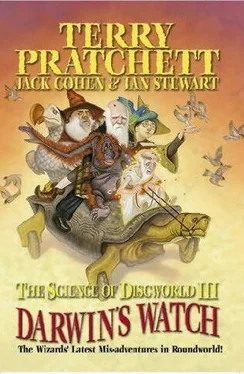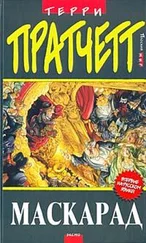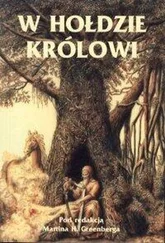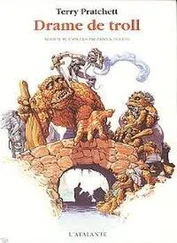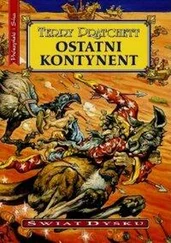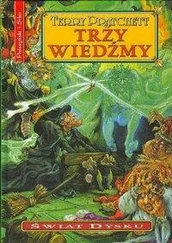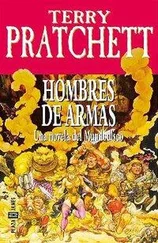Terry Pratchett - Darwin's Watch
Здесь есть возможность читать онлайн «Terry Pratchett - Darwin's Watch» весь текст электронной книги совершенно бесплатно (целиком полную версию без сокращений). В некоторых случаях можно слушать аудио, скачать через торрент в формате fb2 и присутствует краткое содержание. Жанр: Фантастика и фэнтези, на английском языке. Описание произведения, (предисловие) а так же отзывы посетителей доступны на портале библиотеки ЛибКат.
- Название:Darwin's Watch
- Автор:
- Жанр:
- Год:неизвестен
- ISBN:нет данных
- Рейтинг книги:3 / 5. Голосов: 1
-
Избранное:Добавить в избранное
- Отзывы:
-
Ваша оценка:
- 60
- 1
- 2
- 3
- 4
- 5
Darwin's Watch: краткое содержание, описание и аннотация
Предлагаем к чтению аннотацию, описание, краткое содержание или предисловие (зависит от того, что написал сам автор книги «Darwin's Watch»). Если вы не нашли необходимую информацию о книге — напишите в комментариях, мы постараемся отыскать её.
Darwin's Watch — читать онлайн бесплатно полную книгу (весь текст) целиком
Ниже представлен текст книги, разбитый по страницам. Система сохранения места последней прочитанной страницы, позволяет с удобством читать онлайн бесплатно книгу «Darwin's Watch», без необходимости каждый раз заново искать на чём Вы остановились. Поставьте закладку, и сможете в любой момент перейти на страницу, на которой закончили чтение.
Интервал:
Закладка:
The big difference that made Victorian Britain successful, itself fostered recursively by all the success stories within it - and by the disparate nature of these successes, such as Quakers, railways, big beautiful bridges, fewer starving children, control of some diseases - was in the ambience, the context, which promoted difference. It has been fashionable for a particularly naive kind of historian of science to point to the social context of scientific theories, and to pretend that science is therefore entirely socially driven. It is usually claimed, by the same token, that this provenance denies science its authority, so its truths merely follow social convention.
Victorian evolutionists provide a precise refutation of that view.
Wallace, for example, was born to poor parents, was apprenticed to a watchmaker for a while (obviously one of our wizards had been instructed to achieve this), then became a successful - though indigent - land agent, then a more successful animal and plant collector. He never made enough money to join the upper middle class, even after his star had risen alongside Darwin's.
Darwin was a junior aristocrat, his parents were well off, and it would have been entirely proper for him to have become a curate - and, indeed to have written Theology of Species. Other proevolutionists, as various as Owen (mistaken by Darwin for an anti-evolutionist because of his careful analysis of the anatomical implications of the Darwin/Wallace natural-selection idea), Huxley, Spencer, Kingsley, were all from different strata of society. We have seen that the first printing of Origin of Species was inadequate for the market, and all copies were sold by the second morning after publication. Would that have happened in nineteenth-century India? In Russia under the czars, or after the revolution? In the United States ... possibly. And in the German part of Prussia. Dickens's stories, critical as they were of the existing order, were anxiously awaited by all strata of society in England - and by many in the eastern United States.
It would not have been quite so strange if this heterogeneous society involved different groups that picked up on different ideas, according to their various philosophies and theologies. However, what really happened, both to Dickens and to Darwin and later to Wells, was a very general appreciation of their radical ideas, very widely, across all of those diverse groups. The same alternative views were welcomed by many different strata of society. More so, perhaps, than in any other society since, heterodoxy was almost the rule. Working men's clubs were hotbeds of rational argument, thanks to the establishment of evening classes by the Workers' Educational Association. Education for the common man was promoted by the new technical colleges and the British Association for the Advancement of Science.
To some extent, the same went for all the embryo universities which, in Victorian times, had been seeded by philanthropic discussion groups in the big cities. These establishments, dark red-brick buildings found in the centres of all English industrial cities, were very different organisations from the ancient universities. The other half of the building, or the building opposite on the same street, was often the public library, an organisation not to be found in Russia or China at that time. These organisations provided a way up from manual labour to artisan, and there were a thousand such establishments all over Victoriana.
The real universities, of Oxford, Cambridge, Edinburgh, St Andrew's, were promoting orthodoxy via classics and the literary and governmental arts. The sciences were slowly coming in, mainly as theoretical physics and astrophysics, which needed only brains and blackboards, like mathematics. Practical sciences like geology and palaeontology, chemistry, and zoology went on in dark and dirty laboratories with tall glass and dark wood partitions; botany was backed up by aromatic herbaria. Such work had a very low status compared to mathematics and philosophy - it had associations with manual labour and dirt. However, archaeology, because of its continuing association with the classical world and its artefacts, had quite high status.
The burgeoning middle class didn't, by and large, aspire to these arcane practices. They wanted technical and scientific information, not to potter about with theories, however important and romantic. They didn't want classical anything, certainly not the classics. The universities proper were still requiring a classical education of all aspiring students, and even in the 1970s they continued to require competence in a foreign language from science entrants (as evidence, presumably, of some culture - they never required science or mathematics from arts or classics entrants). The workmen and the artisans' guilds cooperated to produce the apprenticeship system, and this was in many ways the model for their own educational organisations.
These, notably the WEA, provided exactly what was wanted, guided and monitored by the artisans' guilds and by the elected council representatives who helped oversee their relations with local industry, especially apprenticeship schemes. `City and Guilds' examinations, granting certificates and diplomas, were the educational currency of these self-organised educational systems, and they continued until the 1960s. They were the labels that qualified erstwhile labourers as artisans, worthy of respect by their peers.
This pulling yourself up by your bootstraps into respectable citizenship contrasts with the attitude to elected local councilmen by the universities that these organisations matured into. Like the ancient universities, new ones like Birmingham and Manchester rewarded local elected dignitaries, mayors, and councillors with honorary degrees. These empty titles, contrasting both with the earned certificates of the artisans and with the honorary degrees given to eminent scholars in recognition and respect, ensured a political allegiance - and devalued academia in general. Unfortunately, the profusion of such young universities in late twentieth-century England has meant that non-technical, even non-scientific subjects have again become fashionable, to the exclusion of that artisan education which was so healthy in late Victorian times. The devaluation of academic degrees of all kinds has continued apace, but at the same time the alternative and more worthy routes to self-advancement have atrophied.
Does this matter?
Indeed it does. Perhaps Owen Harry, who had himself risen from a poor Welsh beginning near Cardiffs Tiger Bay to become a very young chief technician in Jack's zoology dept at Birmingham University, and later became a senior lecturer at Belfast University, put this best when he described its main negative consequence as `a lack of sergeants'.
There is a story about officer training and examination in the British Army in the 1950s. One of the most important questions was 'How do you dig a trench?'. The correct answer was `I say "Sergeant, dig me a trench!"' Sergeants are people who organise the doing. They are not experts in what to do, or when: that's the prerogative of officers, who theoretically constitute the brains of the organisation. Officers decide what has to be done, but don't know how to do it. Sergeants don't actually do things, either, except occasionally when they have to. Their role is to organise squads of ignorant men, often incompetent, but well trained to obey orders, so that they cooperate effectively. Sergeants are the layer that makes cooperation effective: they know how to get things done. Privates know how to do what they're told, and are trained not to do anything else.
We didn't say efficient; it's a common mistake to see efficiency as something to be striven for. Efficiency is a concept borrowed from engineering and physics, a measure of how much you get out for how much you put in. Sergeants are in some respects the least efficient way of getting things done; they have a tendency towards repetition and sarcasm, confident that a few of their recruits will graduate from basic training with some degree of competence. But sergeants are very effective, and the system they are part of is very robust.
Читать дальшеИнтервал:
Закладка:
Похожие книги на «Darwin's Watch»
Представляем Вашему вниманию похожие книги на «Darwin's Watch» списком для выбора. Мы отобрали схожую по названию и смыслу литературу в надежде предоставить читателям больше вариантов отыскать новые, интересные, ещё непрочитанные произведения.
Обсуждение, отзывы о книге «Darwin's Watch» и просто собственные мнения читателей. Оставьте ваши комментарии, напишите, что Вы думаете о произведении, его смысле или главных героях. Укажите что конкретно понравилось, а что нет, и почему Вы так считаете.
